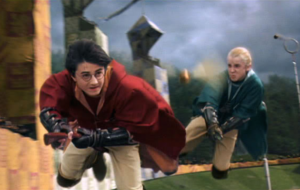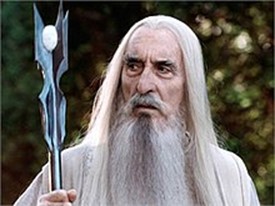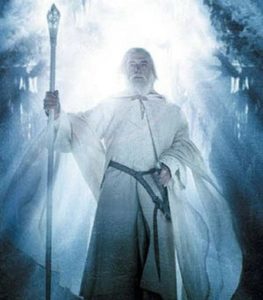A Catholic Lord of the Rings
March 3, 2020
The stories of JRR Tolkien captured the imagination of generations and spawned a stunning trilogy of movies under the direction of Peter Jackson. Even his Hobbit sequels beginning in 2012 were captivating and meaningful. Critics of the 2012 Hobbit trilogy unfairly compared those movies against the incomparable Lord of the Rings trilogy. Even Tolkien's Hobbit fell short of his Rings trilogy.Still, Jackson preserved the rich Catholic metaphors that leaked through Tolkien's writings in glaring ways. The Hobbit and the Rings trilogy portray the big differences between Roman Catholicism and Christianity. (Some Catholics may say the true Divergents are Protestants, but I have heard other Catholics say they are not Christians, they are Catholics.)
 Either way, no matter how Catholic it is, Tolkien does portrays a coherent spiritual view which is entirely lacking in Harry Potter's spiritual wizard world. J.K. Rowling brought together a hodge-podge of half-good, half-selfish and mostly confused kids playing with incredibly lethal spiritual powers, yet predictably nobody gets seriously hurt. (The spell-bound game of Quidditch is not well-suited for 10-year old players, right? How did those kids survive? How could any parent watch their kid play?) Tolkien's spiritual conflicts are at least realistic, filled with savage casualties. Tolkien understood the spiritual world was real, not kid fiction, with real power to kill and corrupt and destroy civilizations. Today's Pop culture more closely follows the never-lethal spiritual world of JK Rawlings, where dabbling is sheer fun, no matter how naïve it is.
Either way, no matter how Catholic it is, Tolkien does portrays a coherent spiritual view which is entirely lacking in Harry Potter's spiritual wizard world. J.K. Rowling brought together a hodge-podge of half-good, half-selfish and mostly confused kids playing with incredibly lethal spiritual powers, yet predictably nobody gets seriously hurt. (The spell-bound game of Quidditch is not well-suited for 10-year old players, right? How did those kids survive? How could any parent watch their kid play?) Tolkien's spiritual conflicts are at least realistic, filled with savage casualties. Tolkien understood the spiritual world was real, not kid fiction, with real power to kill and corrupt and destroy civilizations. Today's Pop culture more closely follows the never-lethal spiritual world of JK Rawlings, where dabbling is sheer fun, no matter how naïve it is.
 In Tolkien's wizardry, there is clear Catholic-style hierarchy which, like Roman Catholic history, also is a mixed bag. Saruman, the great White Wizard whom other low-caste Wizards like Gandalf must address as "Master". He is a popish wizard intoxicated by his exalted position. He drones on with pontifications which were often wrong, always disparaging Gandalf's common-sense wisdom. This fits the pattern of many the "Papal Bulls" issued in Vatican history. (The Vatican now calls them "Encyclicals," possibly to anglicize the term? Or possibly aingvoid the vernacular "Papal Bullsh**"? Sorry, that was bad.) Saruman is a corrupt pope, while Gandalf-the-Grey becomes a reforming pope as Gandolf-the-White, like when Pope Francis disposed of his red, Prada papal shoes, among other reforms.
In Tolkien's wizardry, there is clear Catholic-style hierarchy which, like Roman Catholic history, also is a mixed bag. Saruman, the great White Wizard whom other low-caste Wizards like Gandalf must address as "Master". He is a popish wizard intoxicated by his exalted position. He drones on with pontifications which were often wrong, always disparaging Gandalf's common-sense wisdom. This fits the pattern of many the "Papal Bulls" issued in Vatican history. (The Vatican now calls them "Encyclicals," possibly to anglicize the term? Or possibly aingvoid the vernacular "Papal Bullsh**"? Sorry, that was bad.) Saruman is a corrupt pope, while Gandalf-the-Grey becomes a reforming pope as Gandolf-the-White, like when Pope Francis disposed of his red, Prada papal shoes, among other reforms.
 Tolkien knew corruption was rife in the history of Catholic hierarchy. Beginning with the Benedictines, some of the greatest Monastic movements littering Roman Catholic's 1600-year history were spawning as reforming movements, like the Jesuits, Franciscans and Dominicans. Pope Francis is a Franciscan reformer. The monastics had their own reactionary problems fraught with extreme asceticism and legalism, but they protested webs of political and economic corruption spreading throughout Catholic hierarchy. At least they championed the cause of lowly, neglected laypeople and peasants. Gandalf the Grey, like Pope Francis, used his spiritual powers to help little folk like Hobbits.The whole clergy-laity separation was a misguided effort to control the Kingdom of God, which God can control. St. Peter was the first pope in Catholic history, and a big adversary of the hierarchy. "We are all laity (God's people), we are all clergy (a holy priesthood)," Peter wrote (1 Peter 2:9). Why Peter's declaration does not take precedence over later ecumenical (church) councils is a mystery. (BTW, St. Peter was married and introduced his mother-in-law to Jesus—so why are priests and especially popes be celibate today? A point worth considering, since it breeds so much pent-up sexual frustration-turned-perversion!)Tolkien saw the potential corruption of spiritual authority based on fallible mortals (including wizard-priests), but he also understood that God's Kingdom on earth still involves human intervention. Yet that intervention is authored, guided and backed up by the authority of Almighty God. Throughout his Trilogy, Tolkien's heroes are saved by divine guidance. The apex in The Return of the King parallels the return of Jesus Christ as King, including the prophecies preceding his rule on earth. As with the Bible, "the meek shall inherit the earth," JC said, so Tolkien's true heroes are Hobbits. Elves look like God's angels, apparently immortal. On the evil side there is a pronounced hierarchy of increasingly savage and powerful evil Orcs corresponding to the Bibles view of "rulers and world-rulers" dominating Satan's World System. As in the Bible, in Tolkien's world evil is not an essence of itself, but rather the corruption and pollution of something decent, like with Gollum. Orcs are depraved Elves, like demons are depraved angels. A life spent in pursuit of pleasure and power creates a depraved Gollum enslaved to self-destruction. Such is the ignoble end of hedonism. "Those who seek to gain their lives will loose it," JC guaranteed. Gollum and his ring-obsession depicts it well.It would greatly benefit any student of church history to at least casually peruse the Catholic history Tolkien distills, depicting the inherent frailties of human-based wizardry—the priesthood. Or, for us (lame) laypeople, dusting off the Hobbit trilogy from 2019 for a fresh look will be rewarding. Most fascinating, the insidious nature of an evil, hideous strength spreading throughout Middle Earth is almost prophetic for the 21st Century.
Tolkien knew corruption was rife in the history of Catholic hierarchy. Beginning with the Benedictines, some of the greatest Monastic movements littering Roman Catholic's 1600-year history were spawning as reforming movements, like the Jesuits, Franciscans and Dominicans. Pope Francis is a Franciscan reformer. The monastics had their own reactionary problems fraught with extreme asceticism and legalism, but they protested webs of political and economic corruption spreading throughout Catholic hierarchy. At least they championed the cause of lowly, neglected laypeople and peasants. Gandalf the Grey, like Pope Francis, used his spiritual powers to help little folk like Hobbits.The whole clergy-laity separation was a misguided effort to control the Kingdom of God, which God can control. St. Peter was the first pope in Catholic history, and a big adversary of the hierarchy. "We are all laity (God's people), we are all clergy (a holy priesthood)," Peter wrote (1 Peter 2:9). Why Peter's declaration does not take precedence over later ecumenical (church) councils is a mystery. (BTW, St. Peter was married and introduced his mother-in-law to Jesus—so why are priests and especially popes be celibate today? A point worth considering, since it breeds so much pent-up sexual frustration-turned-perversion!)Tolkien saw the potential corruption of spiritual authority based on fallible mortals (including wizard-priests), but he also understood that God's Kingdom on earth still involves human intervention. Yet that intervention is authored, guided and backed up by the authority of Almighty God. Throughout his Trilogy, Tolkien's heroes are saved by divine guidance. The apex in The Return of the King parallels the return of Jesus Christ as King, including the prophecies preceding his rule on earth. As with the Bible, "the meek shall inherit the earth," JC said, so Tolkien's true heroes are Hobbits. Elves look like God's angels, apparently immortal. On the evil side there is a pronounced hierarchy of increasingly savage and powerful evil Orcs corresponding to the Bibles view of "rulers and world-rulers" dominating Satan's World System. As in the Bible, in Tolkien's world evil is not an essence of itself, but rather the corruption and pollution of something decent, like with Gollum. Orcs are depraved Elves, like demons are depraved angels. A life spent in pursuit of pleasure and power creates a depraved Gollum enslaved to self-destruction. Such is the ignoble end of hedonism. "Those who seek to gain their lives will loose it," JC guaranteed. Gollum and his ring-obsession depicts it well.It would greatly benefit any student of church history to at least casually peruse the Catholic history Tolkien distills, depicting the inherent frailties of human-based wizardry—the priesthood. Or, for us (lame) laypeople, dusting off the Hobbit trilogy from 2019 for a fresh look will be rewarding. Most fascinating, the insidious nature of an evil, hideous strength spreading throughout Middle Earth is almost prophetic for the 21st Century.

What sane parent would let their teenage
or 10-yr-old kid play with spiritual power like this?

Saruman, the bad pope.

Gandolf-the White: a reforming pope.